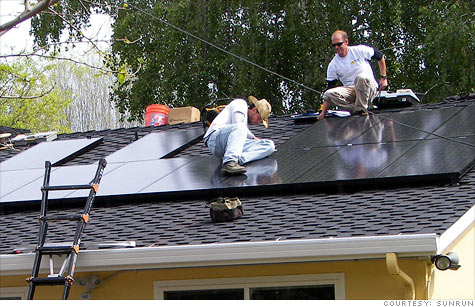
SunRun CEO hopes bundling residential solar power leases into investor-grade products will raise a huge amount of cash for the industry. Will anyone bite?
NEW YORK (CNNMoney) -- SunRun chief executive Edward Fenster has an enviable kind of problem.
His company, which leases roof-top residential solar panels, is growing so fast he's having a hard time finding money to keep up.
 |
| SunRun CEO Edward Fenster |
But he thinks he's found a fix: bundle the thousands of long-term leases his company has signed so far and sell them to investors. Call it the solar-backed security.
"It's really a fantastic tool, it just got abused," said Fenster, referring to the mortgage-backed securities in the subprime lending market that crashed the economy three years back.
The idea will certainly take some selling, but Fenster seems like the guy to do it. Before co-founding SunRun in 2007 he worked at Blackstone, the New York-based private equity powerhouse.
Well versed in finance-speak, Fenster laid out the advantages of securitizing this asset.
It's not just mortgages that get bundled and sold to investors.
Music rights, home security contracts, auto loans and dozens of other products that provide a steady stream of income over a long time period are currently securitized.
Fundamentally, what Fenster has isn't much different. SunRun, one of the biggest residential solar power companies, has over 10,000 leases signed so far. That's 10,000 people paying a fixed amount of money each month for their electricity.
Selling those leases to, say, a pension fund, insurance company or retail investor would get Fenster his much needed capital. He says the company is spending $40 million each month just to keep up with demand -- demand that's growing three-fold each year.
Currently, his financial backers are mainly big banks. For example, SunRun recently partnered with US Bank on a tax equity commitment that supports the purchase got $200 million in solar systems. If the leases were securitized, SunRun would not only be able to diversify its investment base, it would also spread the risk among whoever buys the securities.
Plus, it would unlock the trillions of dollars capital held by big-money funds. This would not only benefit SunRun, said Fenster, but the burgeoning solar industry as a whole.
"The economy is full of people who have too much money and those that don't have enough," he said. "The securitization market fixes an enormous inefficiency."
That may be the case, but convincing investors that these won't blow up in some big subprime mortgage reprise is perhaps the biggest hurdle this idea faces.
Like subprime mortgages, the product is not all that diverse.
It's not likely that homeowners would suddenly default on their lease payments en masse under normal circumstances, but what if something abnormal happened.
A volcano that obscured the sun? An earthquake that took out a huge number of homes?
"Yeah, it's a Black Swan scenario," said Nathaniel Bullard, an analyst at Bloomberg New Energy Finance. "But that has caused trouble for these securities before."
Then there's the homeowner. Will they be OK with their leases being sold to a third party?
And having a third party be a creditor to an asset on a home might cause problems for mortgage lenders too, said Bullard.
That said, he believes the idea is a solid one and that there will be investor interest. In fact, he said he's heard of a half dozen other similar ideas floated in the last couple of months, usually by people on the financing end of things.
Financing is a huge issue, said Bullard, and the success or solar power depends just as much on the availability of money as it does the technology. "If you look at the financing available from pension funds, endowments, it's a very large pot," he said.
Other analysts agreed, citing the huge jump in solar panel installations. Nationwide, the number of homes with solar has gone from under 10,000 annually in 2006 to nearly 50,000 in 2010, according to the Solar Energy Industries Association.
"The market is taking off faster than people expected," said Matt Feinstein, an analyst at Lux Research, an emerging technologies research firm. "They need access to this capital to expand as fast as they want." ![]()